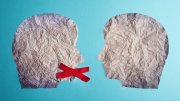What obstacles impede the free exchange of ideas in college classrooms? And how might they be overcome? “Free Speech on Campus,” a September 20 talk by Vuilleumier professor of philosophy Edward “Ned” Hall that was followed by a response from Conant University Professor Danielle Allen grappled with the causes of constrained conversation in campus educational settings. The lecture was sponsored by the Council on Academic Freedom at Harvard, which was formed during the past academic year by University faculty members concerned about perceived threats to free speech. The event, held in Boylston Hall, was also live streamed with support from Harvard Alumni for Free Speech, an organization “dedicated to preserving and promoting free expression, academic freedom, and viewpoint diversity throughout the global Harvard-Radcliffe community.”
Hall, one of six co-presidents of the faculty-led Council, began with a “mini-class in epistemology” by asking the audience to consider a story:
A father and his son are involved in a horrific car crash, and both are rushed to the hospital. When the child is brought into the operating theatre, the surgeon stops short and says: “I can’t operate on this boy, he’s my son.”
How can this be?
Students who have not seen this question previously will often answer that the boy’s parents might be a gay married couple, Hall reported. “That’s a perfectly good answer,” he said. But the response frequently missed by men and women alike is that the surgeon is the boy’s mother. Hall explained that the point was not to suggest that “no one can escape the patriarchy,” but rather that these kinds of cognitive deficits can affect anyone. When confronted with a question, there may be some answers that—for any number of reasons—are “out of view.” One of Hall’s former students described this as a kind of ignorance that consists not in a mere lack of knowledge, but in overlooking a possibility—ignorance as a kind of blind spot.
This kind of ignorance does not turn on what a person does or does not know, Hall continued, but rather on what a person is capable of entertaining—the range of possibilities they are able to consider. What is the antidote to that kind of ignorance? Hall argued that the answer is probably to become highly skilled at inquiry—and answering his earlier question about the social purpose of colleges and universities, suggested that this is the principal value of higher education. Storing knowledge, he said, is not the point: “Successful inquiry requires setting up a good question, and then being able to canvass a sufficiently rich range of possible answers….”
Hall surveyed the dynamics of ignorance at the individual and even group level (in which social forces, for instance, may prevent certain forms of inquiry) and suggested how ignorance in its various forms might be neutralized or overcome in the case of individuals by cultivating an “egalitarian curiousity.” And he proposed a reformulation of the purpose of a liberal arts education: that it should “aim to equip students with the skills, knowledge, and habits of mind needed to diagnose, guard against, and combat ignorance, both in themselves and in the groups to which they do or will belong.”
In her response, Danielle Allen focused on instances when speech threatens tangible harm to certain individuals. “Beliefs,” she pointed out, “aren’t separate from the world of their concrete implications.” Some ideas are threatening because they could lead to actions that manifest as “hostility toward me.” For example, if a person made the case that it is justifiable to enslave human beings and “to decide whom to enslave on the basis of the color of their skin, I would consider that threatening, because ideas are rules of action,” she said, alluding to a core tenet of philosopher William James. “And I would immediately have concern about how a commitment of that kind would translate into effort in the world, and what I should do about that….” Similarly, if a person believed that killing someone for cheating on his or her partner was justifiable, Allen said, she would place that idea in the category of “moral error.”
Those moral-error cases are “only the second hardest problem,” she added. The hardest problems are “the cases that are at the gray line…. How do we know where the line is between moral error and a heretical but considerable idea? Is that what we’re struggling with on college campuses? I don’t know the answer to that question.”
Video of the full 90-minute event, including introductory remarks by Council executive director Flynn Cratty and Danoff dean of Harvard College Rakesh Khurana—who has been leading a parallel effort focused on enhancing “intellectual vitality” among undergraduates—can be seen here.









